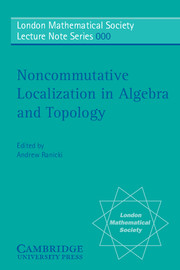Book contents
- Frontmatter
- Contents
- Dedication
- Preface
- Historical Perspective
- Conference Participants
- Conference Photo
- Conference Timetable
- On flatness and the Ore condition
- Localization in general rings, a historical survey
- Noncommutative localization in homotopy theory
- Noncommutative localization in group rings
- A non-commutative generalisation of Thomason's localisation theorem
- Noncommutative localization in topology
- L2-Betti numbers, Isomorphism Conjectures and Noncommutative Localization
- Invariants of boundary link cobordism II. The Blanchfield-Duval form
- Noncommutative localization in noncommutative geometry
- Index
Preface
Published online by Cambridge University Press: 19 October 2009
- Frontmatter
- Contents
- Dedication
- Preface
- Historical Perspective
- Conference Participants
- Conference Photo
- Conference Timetable
- On flatness and the Ore condition
- Localization in general rings, a historical survey
- Noncommutative localization in homotopy theory
- Noncommutative localization in group rings
- A non-commutative generalisation of Thomason's localisation theorem
- Noncommutative localization in topology
- L2-Betti numbers, Isomorphism Conjectures and Noncommutative Localization
- Invariants of boundary link cobordism II. The Blanchfield-Duval form
- Noncommutative localization in noncommutative geometry
- Index
Summary
Noncommutative localization is a powerful algebraic technique for constructing new rings by inverting elements, matrices and more generally morphisms of modules. The applications to topology are via the noncommutative localizations of the fundamental group rings.
The volume is the proceedings of a workshop on ‘Noncommutative localization in algebra and topology’ held at the International Centre for the Mathematical Sciences in Edinburgh on April 29 and 30, 2002, with 25 participants. The collection could be used as an introduction to noncommutative localization and its applications, but it is not an encyclopedia. Neither is it just a record of the talks at the meeting: the papers submitted by the participants are much more extensive than their talks, and in addition the volume contains papers commissioned from non-participants. The ‘Historical Perspective’ overleaf sets the papers in a historical context.
The meeting and the proceedings have the aim of bringing together the algebraists and topologists interested in noncommutative localization. I was particularly pleased that Professor Paul Cohn attended the meeting and contributed to the proceedings. He invented the universal ‘Cohn noncommutative localization’ technique which has turned out to be so useful both in its original algebraic setting and in its applications to topology.
The meeting was supported by a Scheme 1 Grant of the London Mathematical Society, and was an activity of the European Union TMR Network ERB FMRX CT-97-0107 ‘Algebraic K-Theory, Linear Algebraic Groups and Related Structures’.
- Type
- Chapter
- Information
- Publisher: Cambridge University PressPrint publication year: 2006

